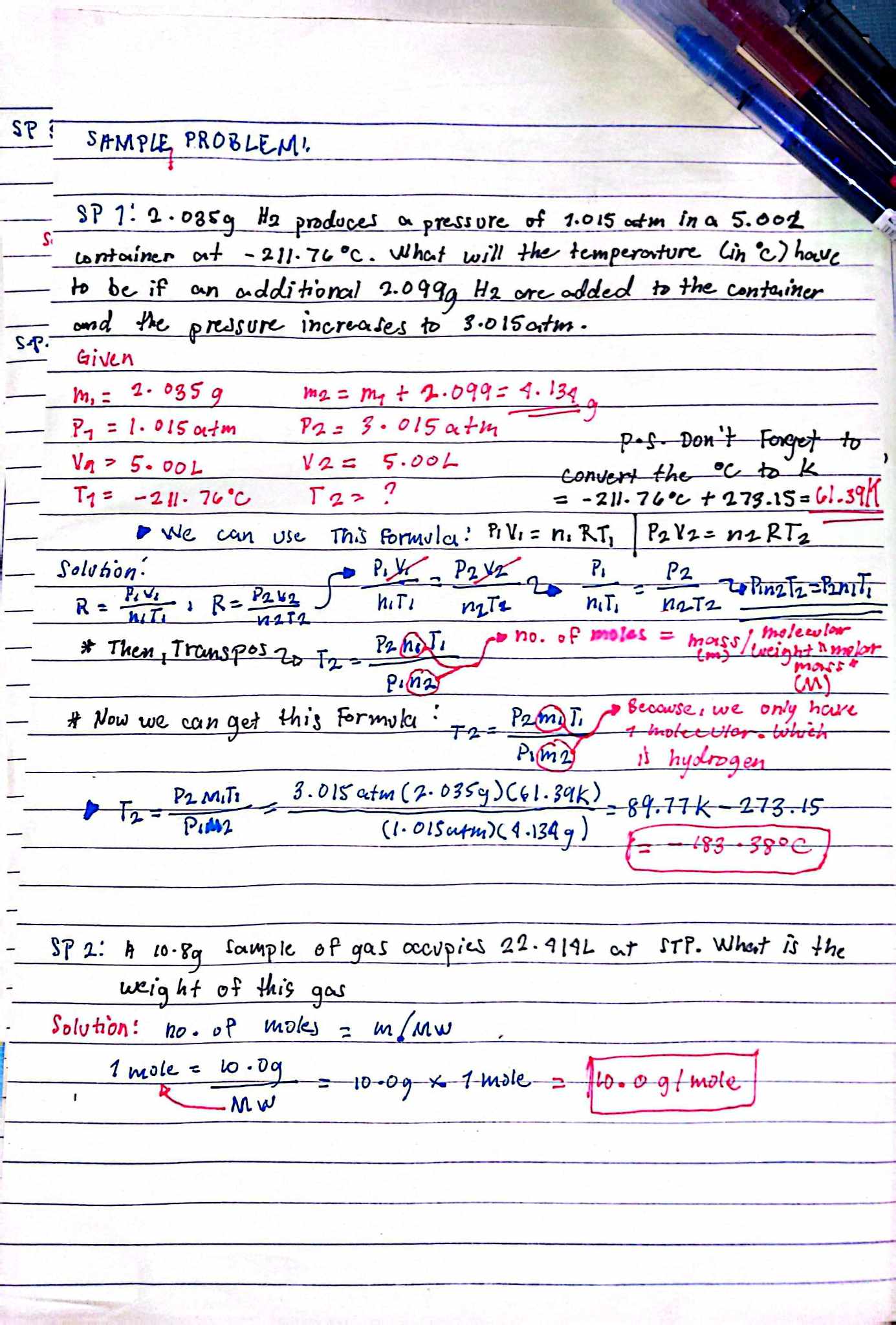SP 1: 2.085g H2 produces a pressure of 1.015 atm in a 5.00L container at -211.76°C. What will the temperature (in °C) be if an additional 2.099g H2 are added to the container and t... SP 1: 2.085g H2 produces a pressure of 1.015 atm in a 5.00L container at -211.76°C. What will the temperature (in °C) be if an additional 2.099g H2 are added to the container and the pressure increases to 3.015atm? SP 2: A 10.8g sample of gas occupies 22.914L at STP. What is the weight of this gas?

Understand the Problem
The question involves two sample problems related to gas laws. The first problem is asking to determine the final temperature of hydrogen gas when additional mass is added and the pressure changes, using the ideal gas law. The second problem asks for the molar mass of a gas given its mass and volume under STP conditions.
Answer
$T_2 \approx -183.38 \, \text{°C}$
Answer for screen readers
The final temperature $T_2 \approx -183.38 , \text{°C}$.
Steps to Solve
-
Identifying Given Values
For SP 1:
- Initial mass of H₂: $m_1 = 2.085 , \text{g}$
- Additional mass of H₂: $m_2 = 2.099 , \text{g}$
- Final mass: $m = m_1 + m_2 = 4.134 , \text{g}$
- Initial pressure: $P_1 = 1.015 , \text{atm}$
- Final pressure: $P_2 = 3.015 , \text{atm}$
- Volume: $V = 5.000 , \text{L}$
- Initial temperature: $T_1 = -211.76 , \text{°C} = -211.76 + 273.15 = 61.39 , \text{K}$
-
Using the Ideal Gas Law
We use the ideal gas law for two states given by: $$ P_1 V = n_1 R T_1 $$ $$ P_2 V = n_2 R T_2 $$
This helps us relate the two temperatures.
-
Converting to Moles
The number of moles, $n$, can be calculated using: $$ n = \frac{m}{M} $$ where $M$ is the molar mass of hydrogen (about $2.02 , \text{g/mol}$).
So, $$ n_1 = \frac{2.085 , \text{g}}{2.02 , \text{g/mol}}, \quad n_2 = \frac{4.134 , \text{g}}{2.02 , \text{g/mol}} $$
-
Rearranging for Final Temperature
Rearranging the ideal gas law for the second state: $$ T_2 = \frac{P_2 m_1 T_1}{P_1 m_2} $$
Substitute the previously calculated values: $$ T_2 = \frac{3.015 , \text{atm} \cdot (2.085 , \text{g}) \cdot (61.39 , \text{K})}{1.015 , \text{atm} \cdot (4.134 , \text{g})} $$
-
Final Calculation
Calculate $T_2$ with the above values:
- First calculate the numerator: $3.015 \cdot 2.085 \cdot 61.39$
- Then calculate the denominator: $1.015 \cdot 4.134$
- Finally divide the two results to get $T_2$.
The final temperature $T_2 \approx -183.38 , \text{°C}$.
More Information
The final temperature represents the state of the hydrogen gas after adding the additional mass and increasing the pressure. It's essential to note that gas behavior can significantly change with pressure and temperature.
Tips
- Forgetting to convert Celsius to Kelvin, which can lead to incorrect calculations in gas law problems.
- Misreading the values given, especially pressure and volume, which can alter the final outcome.
AI-generated content may contain errors. Please verify critical information